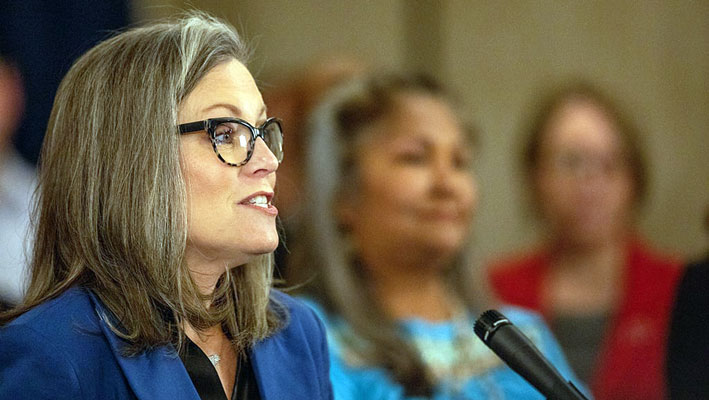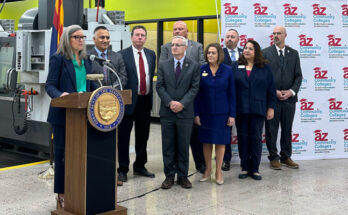File Photo By Drake Presto/Cronkite News: Governor Katie Hobbs, shown here in an April file photo, rejected a request from 12 of the state’s 15 county attorneys that she rescinds an executive order that would give the state’s attorney general the authority to decide whether to prosecute violations of state abortion laws. The local attorneys called the order overreach.
Lauren Irwin/Cronkite News
WASHINGTON – County attorneys are considering the next steps, including the possibility of a lawsuit against Gov. Katie Hobbs after she rejected their request to rescind an executive order that puts the decision to prosecute abortion cases in the hands of the attorney general’s office.
Eleven of the state’s 15 county attorneys joined Maricopa County Attorney Rachel Mitchell in a letter last week that told Hobbs her June 22 executive order is a “sweeping attempt” to upend the duties and discretion that individual county attorneys have in criminal prosecutions.
“This is not about abortion, it’s about, basically, the lanes of power,” said Cochise County Attorney Brian McIntyre, one of the 12 attorneys on the letter. “And the problem is, if this governor gets away with it, if you will, then who’s to say what the next … step might be.”
Mitchell’s letter said the order sets a dangerous precedent because of the power it gives any future governor to grant to an attorney general. The letter called it “a substantial overreach to suggest the governor may strip away prosecutorial discretion from local, elected officials.”
But Hobbs disagreed.
In a response Friday, the governor said her order was not motivated by a desire to interfere with the prosecutors’ discretion, but instead “was a lawful gubernatorial discretion to ensure equal protection and equal access to reproductive healthcare statewide.”
Hobbs said the order – issued nearly a year after the Supreme Court overturned its Roe v. Wade abortion ruling – is needed to put an end to a year of uncertainty around Arizona’s abortion laws.
But in a statement Monday, Mitchell said the governor “does not have authority to strip powers” from county attorneys and the attorney general cannot order local prosecutors “to surrender a case without a specific reason.”
“For all of these reasons, I will conduct the business of my office as I have in the past,” Mitchell’s statement said.
The order calls for “centralizing authority over abortion-related criminal prosecutions” under Attorney General Kris Mayes for any current or future abortion-related prosecution brought by a county attorney.
Since the Supreme Court overturned the constitutional right to abortion last June with its Dobbs v. Jackson Women’s Health ruling, Arizona laws have changed several times. Leaving it up to local prosecutors to decide what cases to press could “lead county attorneys across the State to make disparate decisions on whether and how to criminally prosecute the same, or similar, conduct relating to abortion care and could have a chilling effect that deters and restricts access to lawful abortion care,” the order said.
The order also prohibits state agencies from providing information or assistance to other states for the prosecution of abortion cases that would not be punishable under Arizona law. And it bars the extradition of Arizonans to other states for criminal prosecution on abortion charges.
Finally, the order created an Advisory Council on Protecting Reproductive Freedom charged with expanding access to sexual and reproductive health care in the state.
Most county attorneys who signed the Mitchell letter did not respond to requests for comment Monday on Hobbs’ decision to stand by her order. A spokesperson for Gila County Attorney Bradley Beauchamp said the office declined to comment.
A spokesperson for Pinal County Attorney Kent Volkmer said the office is “evaluating all of our options” on how it wants to proceed.
Of the three county attorneys who did not sign the letter – Pima County Attorney Laura Conover, La Paz County Attorney Tony Rogers and Apache County Attorney Michael Whiting – Rogers and Whiting did not respond to requests for comment Monday. But Conover has defended the governor’s order.
“We agree with the Governor as to both the urgency and severity of this very unique situation,” Conover said in a June 23 statement. “We will voluntarily send all criminal referrals to the Attorney General in the spirit of fixing this constitutional inequity.”
McIntyre said the attorneys who did sign the letter are “still kind of working on that next step.” He said that “Typically, what we’re looking at would be filing a lawsuit, unfortunately.”
“There’s been some discussion but I don’t think there’s a final kind of decision … as a group as to what to do next,” he said Monday. “And that may happen individually like each separate county might take action. Or, like I said, it might happen as a group.”









